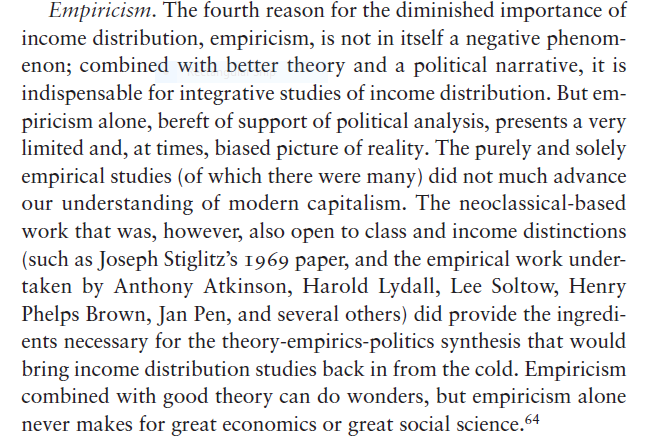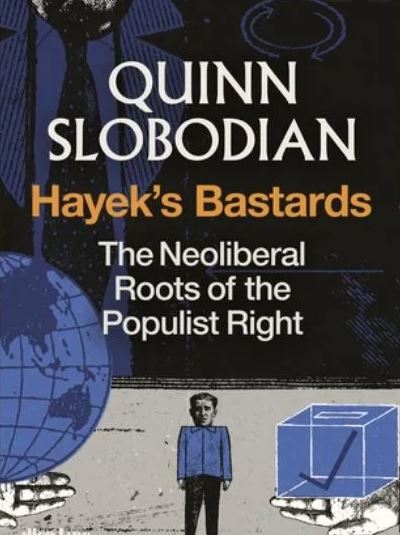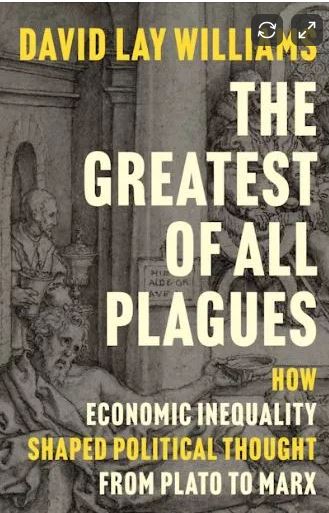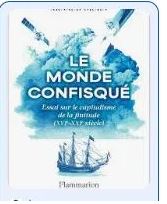(Long thread--but worth reading)
I received lots of pushback (including some pretty nasty comments) on my tweets re. the most recent “Nobel Prize” in economics.
I received lots of pushback (including some pretty nasty comments) on my tweets re. the most recent “Nobel Prize” in economics.
I believe that most comments reflect two entirely different views of economics: what it is and what its objectives are.
Rather than engaging in the methodological debate let me help you understand my views by giving examples of what are the big economic issues today--
Rather than engaging in the methodological debate let me help you understand my views by giving examples of what are the big economic issues today--
--which a big prize should acknowledge.
Not so much to give these people money (they are rich anyway) but as a signaling device so that young economists should study topics that matter to people’s wellbeing in the entire world, and not minor issues.
Not so much to give these people money (they are rich anyway) but as a signaling device so that young economists should study topics that matter to people’s wellbeing in the entire world, and not minor issues.
Minor issues already matter to the rich and those who study them will be well rewarded anyway.
I would avoid mentioning topics that I most care about, and when I mention some people by name they would not be the ones with whom I agree 100%.
I would avoid mentioning topics that I most care about, and when I mention some people by name they would not be the ones with whom I agree 100%.
Ok, let’s start with a huge topic that stares us in face. We have 40 years of the most extraordinary increase in income for the largest number of people ever. Do we know what propelled China’s growth? Perhaps not fully, but there are people who have been writing about it.
They might disagree among themselves, but let’s hear from them. Did, for example, any Chinese *ever* write anything to explain this extraordinary development?
For when we ignore this biggest issue of all, we are --as indeed we seem to be-- in the world of Nobel in literature. At the time when Tolstoy, Joyce and Proust were publishing, the Nobel prize went to… Sully Prudhomme. Yes, Sully Prudhomme (check it out).
Lets go further. Who are the economists who highlighted how privatization might lead to crony capitalism & oligarchy in Russia? Should not they be singled out—as they spoke against the current, and against the popular wisdom at the time and were proven right.
I will mention here Stiglitz (who already got his Nobel, so that's not another nomination) but who was the only person whom I have heard explicitly warning against what happened afterwards. And I know there were others too.
Or people who made us understand how a whole socio-economic system works? The understanding of socialist economics was never the same after Janos Kornai’s works. Isn’t this a big topic: how a system under which 1/3 of mankind lived and worked functions? Not worth highlighting?
The origins of the Industrial Revolution. You might say, who cares? But that’s wrong: if we do not understand how England took off, can we understand how growth that lifts millions of people out of poverty occurs?
There is a fierce debate raging among economic historians on the issue. It is important to bring up the participants. Let us hear them.
Was the growth of capitalism made possible thanks to slavery?Don’t we want to know if capitalism could have emerged w/o servile labor or not? There are many people writing on that. Does welfare of some depend on subjugation of others? What do economists say? Is there a trade-off?
Move to the present. Is CHN destroying Western middle classes? Or it's technology? The topic was opened up by Ricardo 2 centuries ago & still does not have a definitive answer. Do we want to hear what is the current (empirical) thinking? There are insights from US, France, Mexico
How about the monopoly nature of today’s capitalism? Does it reduce everyone’s welfare and make the monopolists control the political process? Does it undermine both competition and democracy? There are many people writing on that too. Shouldn’t they be highlighted?
Or do intellectual property rights condemn to poverty and deaths (today especially) millions in less developed countries? How did IPRs evolve over the past two centuries? What do we gain by enforcing property rights and what do we lose? Isn’t that a big topic?
I could produce at least five similar big topics whose better knowledge may help reduce poverty for many people in both the global South and the global North. And make us understand our present and the past better.
The point I want to make is this: Economics is a social science. Its aim is to make us understand the world and make people’s lives (materially) richer. The work that should be singled out is the work that does that—in a big way.
Quesnay wanted to make France richer. Smith wanted to spread the benefits of the Commercial Revolution to the rest of the world. Ricardo was concerned by the destruction of the engine of growth. Marx wanted to end the class system.
These are the founders of economics. They asked fundamental questions. We should follow them.
@threadreaderapp unroll
• • •
Missing some Tweet in this thread? You can try to
force a refresh








